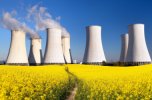- Date
- 31 August 2022
Future Viability of Nuclear Power
Future Viability of Nuclear Power
By Jake Rickman |
What do you need to know this week?
From 2006 to 2020, the portion of power generated from nuclear power plants has decreased by 25%. However, there are signs this trend could reverse itself in the coming years, as France and Belgium both recently indicated they will keep certain nuclear plants running past the date of their planned closure.
While these policy reversals are unlikely to save Europe from this winter’s dire fuel shortage arising from Russia’s restriction on the export of its natural gas, the news implies a fundamental change in the way that the EU and its individual member states are treating energy plans for the future.
Why is this important for your interviews?
Circling in on the business case for nuclear power, especially in light of the energy pressures facing Europe, could serve as a great answer to the common question, “Tell me about a commercial issue that is in the news.”
Nuclear power is a controversial topic. On one hand, it is one of the most efficient forms of renewable energy and more reliable than other alternatives such as solar and wind. On the other, history has given us a series of nuclear catastrophes including Three Mile Island in New York, Fukushima in Japan, and Chornobyl in Ukraine. These, in addition to problems inherent in the storage of nuclear waste, largely explain why nuclear energy has fallen out of fashion around the world.
That said, considering the energy crisis facing Europe, EU member state leaders are reconsidering the viability of nuclear power. Unlike the technology behind wind and solar, which is not able to scale at sufficient speed, nuclear technology has undergone recent developments, such as the emergence of small modular reactors (SMRs). SMRs are more easily constructed than their traditional counterparts, which decreases the capital expenditure required to construct them. If present trends persist, there is a good chance that the future of Europe’s energy will depend on the construction of nuclear power plants.
How is this topic relevant to law firms?
While the extent to which we successfully pursue alternatives to fossil fuel is of course an existential issue, the matter is also an economic one, given the private sector’s role in conjunction with public officials in facilitating the transition. From a business perspective, there is a reason all the Magic Circle are rated as Band 1 firms by Chambers Partners in Energy & Renewables. Law firms will want to capitalise on the newfound political interest in nuclear power.
The construction of nuclear power plants is among the most technically complex construction projects. All stakeholders require competent legal advisers consisting of expert project and asset finance teams, energy and renewables, and regulatory practice groups to coordinate and manage the project. The key stakeholders themselves frequently number in the dozens: most nuclear construction projects involve public bodies like governmental energy departments and sovereign wealth funds, as well as private bodies like banks and insurance underwriters. After construction, the body managing the nuclear plant will employ a large team of in-house and external counsel to advise on contract negotiations with national energy regulators and suppliers.

